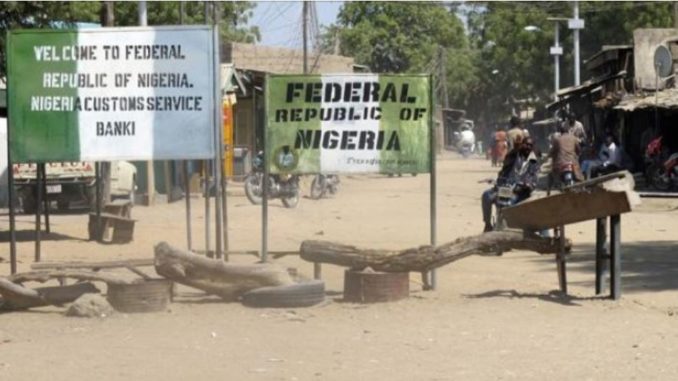
Five months after Nigeria shut its land borders against its West African neighbours to protect her economy, it seems as if the country might not fully reap the benefits of that decision. Essentially, there are persistent reports that cross-border gangs have been exploiting loopholes in the border control effort to undermine government’s intention. A senator, Francis Fadahunsi, has just corroborated this, saying arms are being smuggled into Nigeria despite the border closure. For government to achieve its aim, it ought to re-strategise on the way forward.
The lawmaker’s observation is a reminder that the gains of the closure are being reversed by determined criminals. Fadahunsi, the Chairman of the Senate Committee on Customs and Excise, noted that the smugglers were using some routes linked to markets in the North-East region to flood the country with arms.
Predictably, he cited the Potiskum animal market in Yobe State as “a major cover-up route” being used by the cross-border criminals to infiltrate the country with arms, accusing the illegal vendors of taking advantage of the lax security to bring in weapons to Nigeria. This is unacceptable.
For long, Nigeria has been vulnerable to arms smugglers owing to its porous, undermanned and sprawling land borders. As such, a United Nations Centre for Peace and Disarmament report averred that of the 500 million small and light weapons circulating in West Africa, 350 million – or 70 per cent – were in Nigeria. Apparently, the border closure of the Major General Muhammadu Buhari regime is partly targeted at curtailing arms inflow, but attaining it seems eons away.
“The Malabo routes are unmanned,” the senator’s statement rightly noted. “Efforts by the Navy are on rice and petroleum products, nothing is heard about arms smuggling, which is also prevalent on water routes from Badagry to Epe, Warri, Patani, Sapele, Port Harcourt, Eket, Oron and Lokoja down to Adamawa and Kebbi inland waterways, all with weak security.” This is the plain truth. Consequently, while kidnapping, armed robbery, Islamist insurgency, Fulani herders’ terror acts on farming communities and banditry plague the society, the security agencies are looking askance.
Besides, the smuggling of rice, textiles and petroleum products is still booming, going by media reports, with weak and compromised security agents in the habit of abetting the nefarious activities of the smugglers.
Undoubtedly, the economy has made some gains. Daily, the Nigeria Customs Service has been generating an average of N5 billion. This was near impossible before the border closure. Goods destined for Nigeria passed through the borders undeclared, the neighbours abusing the ECOWAS protocols to flood the country with rice, banned frozen poultry products and other items. The Information and Culture Minister, Lai Mohammed, recently alleged that three ships loaded with rice were about to berth at the Benin ports; the final destination of the cargoes is highly suspected to be Nigeria. Similarly, petrol consumption has reduced by 30 per cent since August, when the closure took off, officials say. Domestic food production is being revived.
All this is good, but it is not possible to shut the land borders interminably. Currently, Nigeria’s border communities, particularly those from where products are exported to the West African market, have started experiencing a downturn in economic activities. The policy barring the sale of petroleum products in communities located 20 kilometres from the international borders has heaped misery on Nigerians living there. Government will be in error to overlook these genuine concerns forever. The regime has to map out an all-inclusive strategy to overcome the criminal elements undermining its authority.
A 2014 United Nations Security Council resolution admitted that the effective policing of borders could be extremely challenging for member nations. The council alluded to the fact that criminals exploit long border spaces and sometimes difficult terrain to perpetrate their evil acts. For Nigeria, which has just 84 approved border posts and 1,499 illegal crossings, according to a former Interior Minister, Abba Moro, it is doubly arduous. The UN said, “The lack of equipment and professionally trained border-security personnel also continues to increase States’ vulnerabilities.” Appropriately, this describes the mess Nigeria finds itself.
To reduce its vulnerability to these elements, it needs to implement well-thought-out policies, some of which have been put to effective use in other challenged countries. On its part, the council urged countries to implement the coordinated border management policy, which “provides for coordination of policies, programmes, and delivery among cross-border regulatory agencies with the aim of strengthening the management of trade and travel flows, while also addressing security concerns.”
Additionally, the Nigerian authorities should redouble their efforts domestically. Critical areas in need of attention include the port operations, where cargo dwell time is up to three weeks because of dodgy, manual clearing of goods and poor associated infrastructure. At the ports, it should accord priority to less human interface and promote the use of technology.
The land borders require utmost attention. The Nigeria Immigration Service, the NCS, police and military, particularly the Nigerian Navy and the Nigerian Air Force, need to work in synergy, deploying technology for border control. Primarily, this is because the global arms trade is a formidable one, worth $100 billion annually as of 2017, according to the Stockholm International Peace Research Institute. Government needs all its mettle to tackle these nefarious traders. It should not shy away from clamping down on the trade, prosecuting and punishing those who undermine the security system through the borders.
The intransigence of Nigeria’s neighbours has done too much damage to her economy. The authorities should not bow to the neighbouring countries in the negotiations for the reopening of the borders until they have complied with the ECOWAS protocols on the movement of goods and services, as Nigeria has repeatedly stated.
END

Be the first to comment